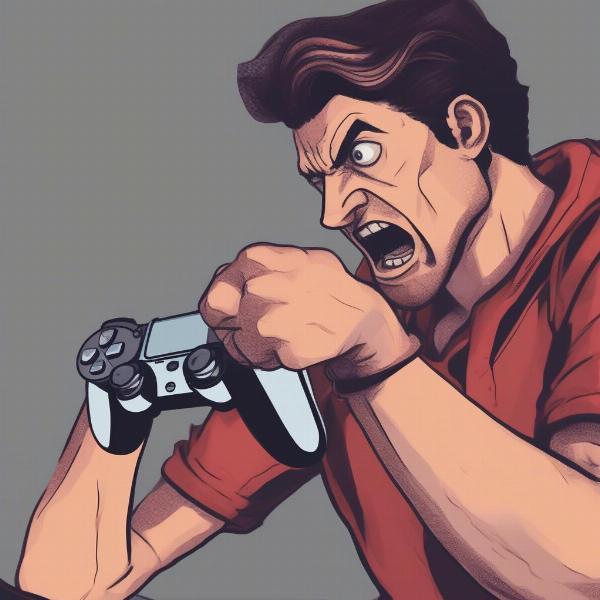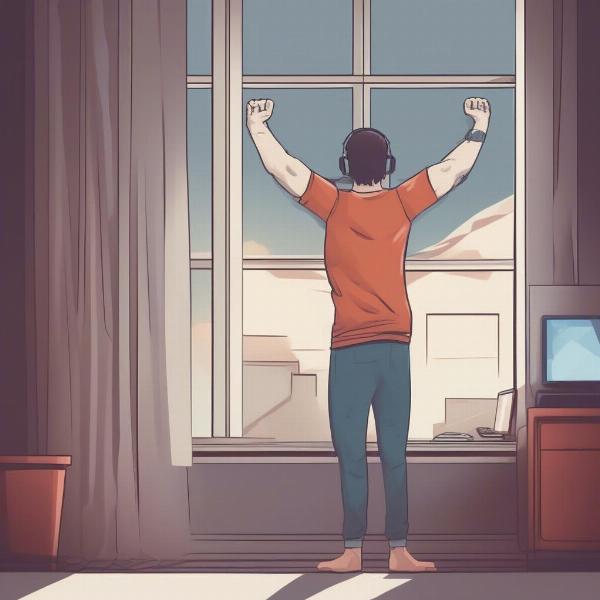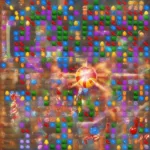“Is Only Game Why You Heff To Be Mad?” This question, often posed in frustration by those outside the gaming community, highlights a common stereotype: the angry gamer. While outbursts of frustration can happen, the reality is far more nuanced. This article explores the psychology behind gamer rage, offering practical tips for managing those heated moments and fostering a more positive gaming experience.
Understanding the Roots of Gamer Rage
The intensity of emotions in gaming, both positive and negative, stems from the deeply engaging nature of the activity. Games demand focus, quick thinking, and strategic planning. When these efforts are thwarted, frustration can quickly boil over. It’s not just about losing; it’s about the perceived injustice, the feeling of having your skill and effort undermined by factors outside your control – a glitchy server, a teammate’s unexpected move, or simply a string of bad luck. This perceived lack of fairness can trigger a primal fight-or-flight response, leading to anger and aggression.
The Psychology of Competition and Control
Competition is a core component of many games, adding a layer of pressure and emotional investment. The desire to win, to prove your skill, can amplify the frustration when things don’t go your way. Similarly, the sense of control, or lack thereof, plays a crucial role. Games offer a world where players can exert influence and make choices, but unexpected glitches or seemingly unfair mechanics can shatter that illusion of control, leading to feelings of helplessness and anger.
 Gamer experiencing frustration while holding a game controller
Gamer experiencing frustration while holding a game controller
The Influence of Online Interactions
Online gaming introduces another dimension to the equation: social interaction. The anonymity of the internet can sometimes embolden negative behavior, leading to toxic interactions, harassment, and trolling. These encounters can fuel anger and create a hostile environment, exacerbating the emotional rollercoaster of gaming. Constructive communication and positive interactions, however, can create a supportive community that enhances the gaming experience.
Taming the Tilt: Strategies for Managing Gamer Rage
Recognizing the triggers and understanding the underlying psychology is the first step towards managing gamer rage. Here are some practical strategies to help you keep your cool:
-
Take Breaks: Stepping away from the game, even for a few minutes, can help you reset and regain perspective. Physical activity, such as a short walk or some stretching, can further diffuse tension.
-
Mindful Breathing: Deep, controlled breathing can calm your nervous system and reduce feelings of stress and anger. Try focusing on your breath for a few minutes when you feel your frustration rising.
-
Reframe Your Thinking: Challenge negative thoughts and replace them with more positive or realistic ones. Instead of focusing on the unfairness of a situation, try to learn from the experience and identify areas for improvement.
-
Adjust Your Expectations: Recognize that losing is a part of gaming. Focus on enjoying the process and improving your skills, rather than solely on winning.
-
Mute or Block Toxic Players: Don’t engage with negativity. Utilize the mute or block features to create a more positive online environment.
 Gamer taking a break from gaming to relax and de-stress
Gamer taking a break from gaming to relax and de-stress
Cultivating a Positive Gaming Environment
Creating a positive gaming environment benefits everyone. Here are some tips for fostering a more enjoyable and supportive community:
-
Practice Good Sportsmanship: Congratulate opponents, offer encouragement to teammates, and avoid gloating or blaming.
-
Report Toxic Behavior: Don’t tolerate harassment or other negative behaviors. Use the reporting tools available in most games to help maintain a healthy community.
-
Communicate Constructively: Clear and respectful communication can prevent misunderstandings and diffuse tense situations.
-
Focus on Fun: Remember why you started gaming in the first place: to have fun! Keep that in mind, even when faced with challenges.
Expert Insights on Gamer Rage
Dr. Anya Sharma, a renowned psychologist specializing in gaming and online behavior, notes, “Gamer rage is often a manifestation of underlying stress and frustration. Recognizing the triggers and developing coping mechanisms are crucial for maintaining a healthy relationship with gaming.”
The Future of Gaming and Emotional Regulation
As gaming technology continues to evolve, incorporating features that promote emotional regulation and positive interactions could become increasingly important. Imagine games that offer personalized feedback and coping strategies based on player behavior. Such advancements could help create a more inclusive and enjoyable gaming experience for everyone.
Is Only Game? No, It’s About More Than That
“Is only game why you heff to be mad?” The answer is a resounding no. While frustration can be a part of the gaming experience, it doesn’t have to define it. By understanding the psychology behind gamer rage, implementing practical strategies for managing emotions, and fostering a positive gaming environment, we can transform gaming into a truly enjoyable and fulfilling experience. Let’s shift the focus from anger to enjoyment and build a community where everyone can thrive. What are your strategies for managing frustration while gaming? Share your tips in the comments below!
FAQ
-
What is gamer rage? Gamer rage refers to outbursts of anger or frustration during gameplay, often triggered by perceived unfairness, challenging opponents, or technical difficulties.
-
Is gamer rage normal? Experiencing occasional frustration is normal, but frequent or excessive anger may indicate underlying issues.
-
How can I control my gamer rage? Taking breaks, practicing mindful breathing, reframing negative thoughts, and adjusting expectations can help manage gamer rage.
-
What can I do about toxic players? Utilize mute and block features and report negative behavior to game administrators.
-
How can I create a positive gaming environment? Practice good sportsmanship, communicate constructively, and report toxic behavior to foster a more enjoyable gaming experience for everyone.
-
Can gaming help with emotional regulation? While gaming can trigger strong emotions, it can also provide opportunities to practice emotional regulation and develop coping skills.
-
What is the future of gaming and emotional regulation? Future game development may incorporate features designed to promote emotional regulation and positive interactions, creating a more inclusive and enjoyable gaming experience.

